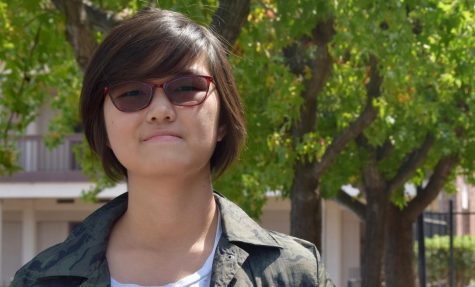owadays, Easter is more likely to recall images of marshmallow Peeps and plastic eggs than Jesus’ resurrection. Yet for students like senior Kevin Tong and sophomore Yoanna Lee, Easter is more than just pastel colors and egg hunts; Easter is the cornerstone of their religion.
“We say that [Easter’s] the day that Jesus resurrected and if that resurrection didn’t happen, we say that there’s no point in our [Christian] faith, that everything we do up till now — there’s no significance, there’s no meaning to it,” Lee said.
And for Tong and Lee, that faith is the foundation of their belief systems.
“My faith is important to me because everything I live by is rooted in that faith,” Tong said. “Every decision I make, my integrity, my belief system is all based on that faith.”
In terms of celebration, Easter Sunday, which commemorates Jesus’ resurrection following his crucifixion three days prior, doesn’t differ too much from a regular church service, at least at Tong and Lee’s churches. Since there’s a number of important holidays like Good Friday that occur before Easter Sunday as well, Lee, who attends Korean Emmanuel Presbyterian Church, says that some people attend church services the Friday before Easter in addition to the service that takes place on Easter. The Bible says this Friday, otherwise known as Good Friday, is when Jesus was nailed to the cross.
At Tong’s church, Chinese Church In Christ (CCIC) Cupertino, he says their church typically has a special Sunday school and lesson for both non-believers and believers that teaches the significance of Easter and the resurrection, followed by lunch. But for Tong, he regards Easter in the same way he would any other day, since the values emphasized during Easter, like faith and grace, are values that he already thinks about frequently.
“I don’t treat it as any different from any other Sunday or any other day because I am constantly thinking about what Easter represents,” Tong said. “But I think Easter is a really good time for a little bit of extra remembrance and just realizing what Jesus has done.”

Though some dislike the commercialization of Easter, Lee says she finds the Easter eggs and pastel bunnies cute. She references how another Christian holiday, Christmas, has become a time for family gatherings and decorated trees even though the original purpose was to celebrate the birth of Jesus. She also mentions how All Saints’ Day, which was originally a day to honor the dead, has transitioned into the spooky, sugar-filled holiday we know as Halloween. To her, the shifted meanings of these holidays are entirely acceptable.
“With any tradition, they often have an origin,” Lee said. “But with today’s society, today’s standards and everything, we’ve changed so much … It’s just how society has transformed that holiday into what they want, so for me I think it’s kind of stupid when people start making a huge deal about [the commercialization of holidays.]”
Though Easter is technically a religious holiday, not everyone that celebrates it is aware of its religious history. Sophomore Madeleine Clark is an atheist and although she says she never found out about the religious significance of Easter until she was older, it was a holiday that she always celebrated as a child with neighborhood egg hunts and an Easter basket, a tradition that her family has held for years.
“I think it’s good for everyone, even if they’re not religious, to have a day to celebrate, to eat good food, to hang out with their families,” Clark said. “But I do think it’s important that a lot of holidays in the U.S., especially Christmas, have become more about getting really expensive presents and more about the money aspect instead of the aspect of being together with your family.”

For Tong, attending church every Sunday, as well as on Friday nights for youth group, has taken on a more personal meaning for him as he’s gotten older. He says that at first, he attended church simply because that’s what his family did.
“I want to go to church because I feel a sense of community with people that attend church as well,” Tong said. “But also I feel like for me, it’s necessary to go to church in the sense of reestablishing and rebuilding my faith, because oftentimes when you don’t go, you forget or you start to feel a little bit apathetic, but going to church is a real good reminder [of one’s faith].”
Even though Clark herself isn’t religious, she believes that a sense of community is what’s most important when it comes to celebrating religious holidays like Easter, rather than the religious aspect.
“I feel like as an atheist, a lot of times I don’t probably celebrate holidays to their full extent that other people do … but for us holidays are just a time to take a break from your life and spend time with people that matter,” Clark said. “I think that’s all that’s important.”
Tong feels that during Easter, churches become an even closer community of people who share the same faith with each other, gathered in remembrance of Jesus’ sacrifice and his resurrection.
“Easter is a really awesome time in the church because everyone’s so friendly, everyone’s so warm,” Tong said. “You really feel a sense of community within the church.”
Similarly, Lee expresses that Easter and Christianity have taken on a more personal role in her life as she’s gotten older.
“When you’re younger, you just follow what your parents do, you follow what your friends do, you just follow the norm and you think nothing’s wrong with that — so then Easter was just Easter. It was [just] a date,” Lee said. “But then as I got older and I really made the faith my own faith and I started to really take my own beliefs into my own hands … that became so much more real to me.”
The significance of church in Lee and Tong’s lives have shifted as they’ve gotten older, while Clark’s atheist beliefs give her a different perspective on traditionally Christian holidays like Easter. And although they’ve grown from running around picking up Easter eggs to developing a deeper understanding of both Easter and Christianity, the spirit of Easter, whether it be through family traditions or religions festivities in church, remains the same.









